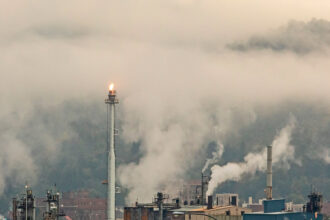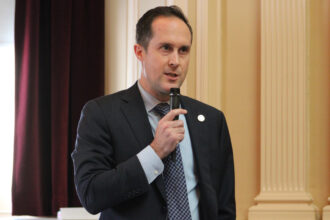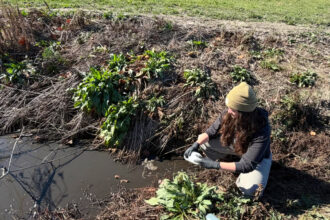Copenhagen Draft Urges Emissions Peak by 2020 (Reuters)
A Danish draft that could form the basis of a political climate deal suggests global emissions peak by 2020, and it calls for a global cut in greenhouse gas emissions of 50 percent from 1990 levels by 2050, with rich countries responsible for most of the work.
Money Matters in the Back Rooms at Copenhagen (Guardian)
Industrialists, financiers, bankers, business groups and carbon traders know there is much more in play at the Danish capital than a concern for lives and the health of the planet.
Copenhagen’s Missing Ingredient: Water (Los Angeles Times)
Scientists stress water’s profound link with climate change, yet delegates at next week’s conference have removed water issues from the working draft of an environmental treaty.
UK Commits £50M to Research for Developing Nations (Business Green)
The UK has committed £50 million over the next five years to create a global research network that developing nations can use to better understand possible strategies for tackling the effects of climate change.
UK Conservatives Look to Break up Big Six Energy Firms (Guardian)
The Conservative party is drawing up radical plans to break up the "Big Six" energy companies in an attempt to increase competition and reduce customers’ bills, setting the Tories on a collision course with the industry.
Ethanol’s Boom Goes Bust (Minneapolis Star-Tribune)
It’s a big week for the U.S. ethanol industry, in a funk as of late amid boom-and-bust cycles in corn and oil prices. The EPA might raise the 10% cap on fuel blends.
Carbon Capture with Nanotubes (MIT Tech Review)
Startup Porifera, an ARPA-e recipient, claims its carbon-nanotube membranes could capture one billion to three billion tons of carbon dioxide a year and save $10 billion a year compared to existing technology.
Copenhagen: The Key Players (Guardian)
A look at some of the key players among a huge cast of characters that will debate, cajole and eventually decide on a deal at the Copenhagen climate summit next week.
Carbon-Credit Dispute Threatens Climate Deal (Washington Post)
Russia is amassing a huge surplus of carbon credits and insists that any new climate agreement allow them to be carried over. Environmentalists say that would cripple any treaty by making it much cheaper for countries to buy credits than cut emissions.
EU: China Must Show Leadership on Climate Change (AFP)
The EU said today that cataclysmic climate change cannot be averted without Chinese leadership, as the two sides wrapped up a summit with China defending its efforts against global warming.
Indian Climate Envoy Resists Emission Targets (AFP)
India’s chief climate negotiator flatly rejected taking on emission reduction targets a day after Prime Minister Manmohan Singh said the country would commit to cuts.
India to Invest $35M in Renewable Energy by 2017 (Dow Jones)
India hopes to invest $35 billion in renewable energy generation from 2012 to 2017 with a goal of tripling its capacity to 48,000 MW, a government official told Parliament today.
Tree Harvester Offers Plan to Preserve Indonesian Forest (New York Times)
One of the most detailed plans to stop greenhouse gas emissions from peat land in Indonesia comes from a paper company that has also been a driving force of deforestation. The company proposes a ring of tree plantations, but wants carbon credits.
Tale of Two Families: Facing Climate Change in Bangladesh (Guardian)
Climate migration has already begun in Bangladesh. In a video, two families struggle to cope with their new environmental reality — one abandoning the village, the other struggling on against the tides.
About This Story
Perhaps you noticed: This story, like all the news we publish, is free to read. That’s because Inside Climate News is a 501c3 nonprofit organization. We do not charge a subscription fee, lock our news behind a paywall, or clutter our website with ads. We make our news on climate and the environment freely available to you and anyone who wants it.
That’s not all. We also share our news for free with scores of other media organizations around the country. Many of them can’t afford to do environmental journalism of their own. We’ve built bureaus from coast to coast to report local stories, collaborate with local newsrooms and co-publish articles so that this vital work is shared as widely as possible.
Two of us launched ICN in 2007. Six years later we earned a Pulitzer Prize for National Reporting, and now we run the oldest and largest dedicated climate newsroom in the nation. We tell the story in all its complexity. We hold polluters accountable. We expose environmental injustice. We debunk misinformation. We scrutinize solutions and inspire action.
Donations from readers like you fund every aspect of what we do. If you don’t already, will you support our ongoing work, our reporting on the biggest crisis facing our planet, and help us reach even more readers in more places?
Please take a moment to make a tax-deductible donation. Every one of them makes a difference.
Thank you,











